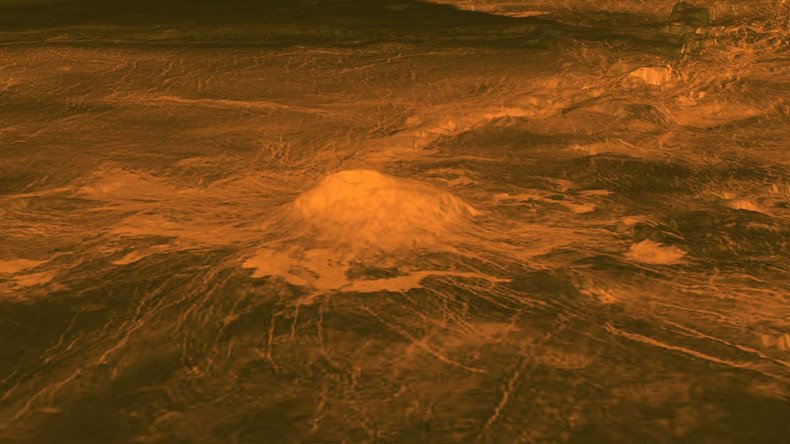Lava love for Venus: Scientists find evidence of active volcanoes on planet

Earth’s twin planet may be more active than previously thought with scientists discovering evidence of a volcano recently spewing lava on the surface of Venus.
Using near-infrared imagery from the European Space Agency's (ESA) Venus Express mission and high-res radar photos taken by NASA’s Magellan probe, scientists discovered heat variations around Idunn Mons, a volcano with a diameter of 125 miles.
The 5 lava flows discoverd on Venus's Idunn Mons (credit NASA/JPL-Caltech/ESA/DLR) pic.twitter.com/SoKA1V9Bdb
— Colm McGlinchey (@ColmMcGlinchey) October 19, 2016
"This is particularly important because this is the first time we can map, with such a high resolution, lava flows from a volcanic structure which is believed to be recently or still active on a terrestrial body other than Earth,"said Piero D'Incecco from the German Aerospace Center at a meeting in Pasadena, California.
Volcano outflow modeling on Venus, UV imaging spectrometer of Mars by MAVEN and Rosetta studies the topics of 1st press conference #DPSEPSC
— Nature Astronomy (@NatureAstronomy) October 17, 2016
D'Incecco built a numerical model to simulate lava flows on Idunn Mons, showing results similar to the data collected by the ESA and NASA. Five lava flows are believed to be responsible for the hotspot, with their temperature indicating they occurred in the recent past.
The planet is known for having more volcanoes than any other planet in the solar system but all were believed to be dormant, until now.
Life on #Venus? Planet may have once been habitable - #NASAhttps://t.co/Ar7wXcBx34pic.twitter.com/yqHVgcxGel
— RT (@RT_com) August 11, 2016
Venus is a difficult planet for scientists to study due to its constant cloud cover. Despite this, it has fascinated scientists due to its close proximity to Earth and because of its similarities, including size and mass.
Akatsuki's IR images of Venus' clouds are the ultimate tale of plucking success from the jaws of failure - Satoh at #DPSEPSC#unveilvenuspic.twitter.com/nIPHE6lPli
— Leigh Fletcher (@LeighFletcher) October 17, 2016
The evidence still isn’t enough to confirm the presence of active volcanoes on Venus. NASA’s Veritas mission plans to create a detailed topographical map of the planet which will hopefully be able to add to D'Incecco’s work.
They’ll have to wait a while though, with Veritas currently scheduled to launch in 2021.
Venus’s once-in-a lifetime solar voyage wows onlookers (PHOTOS, VIDEO) http://t.co/kRSpd8Mh
— RT (@RT_com) June 6, 2012












